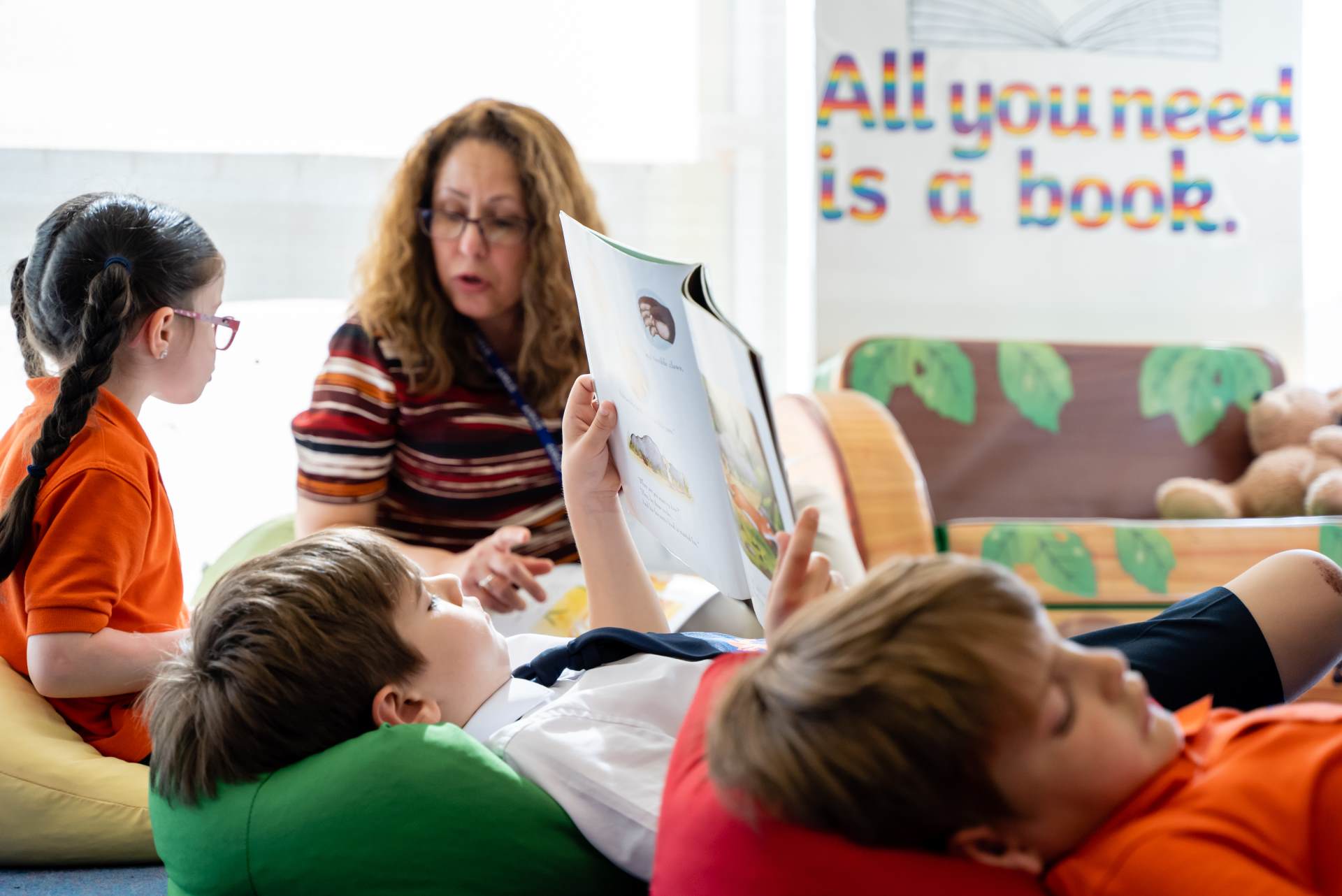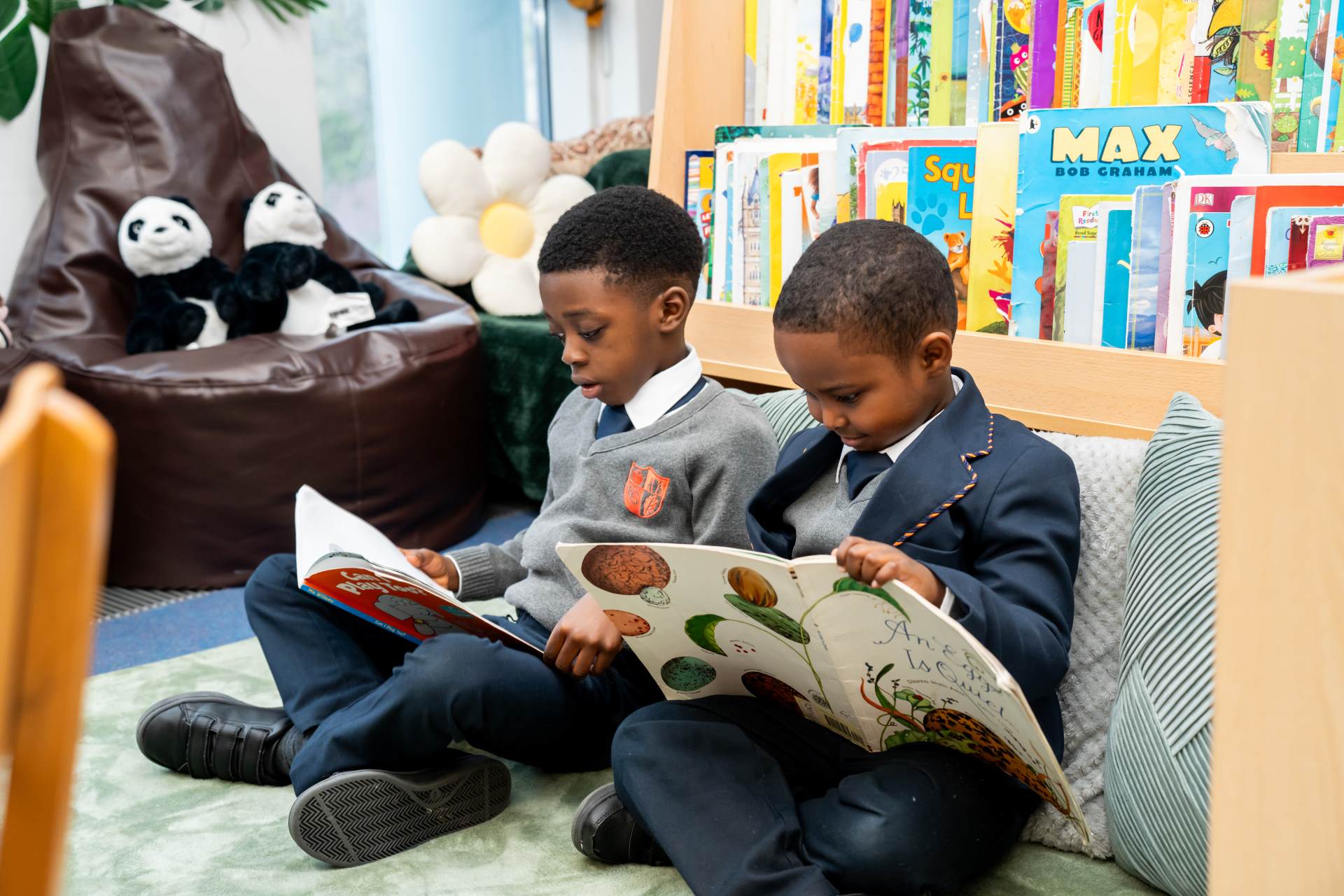English & Phonics

We firmly believe that English is the foundation for children to thrive, achieve, and find joy in learning both at school and in their future endeavours.
As a leading global language, English lies at the centre of our culture, serving as the essential tool for thought and communication. Proficient literacy skills not only empower our pupils to excel in all areas of the curriculum, but also play a pivotal role in shaping their future opportunities and life chances.
Recognized as a vital subject, English is indispensable for academic achievement and personal growth. It is integral to cultural identity and remains a key gateway to global understanding and communication.
Speaking and Listening
We recognize that speaking and listening are foundational elements of high-quality teaching and learning. These skills are integrated into every lesson and supported through a variety of strategies across the school, such as partner discussions (talk-partners), structured sentence stems, interactive homework tasks, visual prompts, fortnightly Picture News activities, talking pictures, class presentations, class / phase / whole school assemblies, targeted questioning, and collaborative group work.
By explicitly teaching all pupils an extensive and diverse vocabulary, alongside the skills required to communicate effectively, we ensure every child has equal opportunities to succeed. Embedding oracy into daily lessons helps foster confident, articulate speakers who can use appropriate non-verbal cues, actively listen, respond thoughtfully, and process information accurately.
Our approach emphasizes the use of academic vocabulary, subject-specific terminology, and the ability to express nuanced ideas clearly. By creating opportunities for meaningful, purposeful discussion that stimulates critical thinking and deepens understanding, we provide pupils with a strong foundation for both academic achievement and lifelong communication skills. These practices are implemented to meet the highest expectations and to prepare all learners for success in a wide range of contexts.
Phonics (Reception to Year2)
We teach phonics using the Magic Phonics Box scheme, a multisensory approach that consists of six stages that pupils progress through sequentially. Each stage includes opportunities for revisiting and consolidating previous learning via recap lessons to ensure proficiency before advancing. This multi-sensory scheme combines songs, actions, mnemonics, and engaging imagery to support all learners, including those with SEND.
The Magic Phonics Box integrates phonics knowledge with reading skills, addressing all reading domains through silly stories from stage three onward. Its unique features, such as phonics families, fun phrases, and interactive tools like the "Tap, Tap Box," promote active, enjoyable learning. A structured teaching schedule ensures consistency, and parents are supported with resources to reinforce learning at home.
Phonics is taught from the first week children start in Reception and up until the first term of Year 2. Towards the end of Year 1, children take a Phonics Screening Check. The Phonics Screening Check shows how well each child can use their phonics skills and knowledge to read a wide range of words. All children are taught to decode and blend using their phonics knowledge to read real words and pseudo-words (words that are not real). Children working through the Magic Phonics Box scheme use decodable reading books to support reading lessons and reading at home.
The Department for Education defines the checks as “short, light-touch assessments” that take about ten minutes to complete. Any children that do not pass the check will continue to take part in phonics lessons or interventions so that they can re-sit the check at the end of Year 2.
For more information about phonics and the phonics check, please refer to the guidance produced by the Standards and Testing Agency.
Reading (Year 2 to Year 6)
Once children complete the phonics programme, they move onto Accelerated Reader. See our leaflet on how Accelerated Reader works.
From Year 2 and above, children follow a 45-minute whole-class Master Reader’s guided reading programme where the structure of teaching is well-defined, allowing children to develop independence in their reading. They engage in meaningful discussions about the text with minimal prompting and learn to provide concise verbal and written responses to questions, drawing on text evidence effectively.
These guided reading sessions take place daily across years 2-6, with each class following a consistent structure (outlined below). The books selected are age-appropriate, yet challenging, covering a variety of themes, conventions, genres, and forms. Each year group focuses on a different genre each term, often linked to their current topic, which includes fiction, non-fiction, and poetry.
Guided Reading Weekly Structure
Monday
A portion of the week's text is introduced to the class. The text is explored collectively, providing teachers the opportunity to model reading aloud. This session helps children develop a deep understanding of the text through discussions on word meanings and basic comprehension using rich, dialogic talk.
Tuesday
The children take on specific reading roles, fostering rich discussions about the text. Each week, children assume a different role:
- Questioner: They write their own questions about the text.
- Summariser: They summarize the main points of the text.
- Predictor: They predict what will happen next, supporting their predictions with text evidence.
- Clarifier: They identify and explain difficult words, phrases, or sections to help the group gain a deeper understanding.
Children work independently in their roles, share ideas with their 'home' group, and then engage in group responses.
Wednesday
The lesson begins with an 'image starter' and class responses to retrieval, inference, and choice questions based on the image. The teacher models how to construct written responses to questions, using metacognition to demonstrate how to find answers in the text and how to write a well-structured response. Different strands of reading are emphasized, and various types of questions are addressed.
Thursday
Children work independently, answering questions similar to those modelled in previous sessions. The teacher may work with a particular group of children to address specific needs.
Friday
Children respond to feedback and next-step marking. Teachers work with targeted groups to address gaps in learning from the week. This could include:
- Revisiting questions from the previous day based on misconceptions or class-wide challenges, especially prioritizing inference objectives for children to practice after discussion.
- Exploring character motivations through activities like 'role on the wall.'
- Shared reading of more text.
- Typing up and sharing varied responses from children's independent work on Thursday.
In Year 6: Children respond to a 'cold read' (unfamiliar text) and answer questions either with guidance or independently
Reception and Year 1 guided reading lessons are structured slightly differently to accommodate the greater proportion of children still working on developing their phonics skills and reading strategies. However, they also read a range of fiction and non-fiction key texts as a class. All class teachers also plan for purposeful opportunities to incorporate reading across the curriculum and various subjects.

English Enrichment
Throughout their time with us, our children are provided with numerous opportunities to engage in a variety of learning experiences outside the classroom. These activities include visits to our local libraries, museums, the theatre both travelling and regional, adventure centres, and community projects. Such experiences offer children valuable real-world contexts that support their development in reading, writing, and speaking. They will also have the chance to meet and collaborate with authors, further expanding their understanding of literature. English learning is integrated and reinforced throughout the wider curriculum, with speaking and writing outcomes drawing on knowledge from other subjects. In turn, English skills are used to enrich learning in all areas.
World Book Day is marked every academic year as part of Book Week every March. A whole school theme is identified and celebrated throughout the week, complemented by other activities such as storytelling workshops and travelling book shops.
To nurture a deeper love of reading, teachers dedicate 10 minutes at the end of most days to reading aloud to their classes. As part of our termly teacher swaps, educators also have the opportunity to read to children in different year groups, fostering a broader appreciation for stories and diverse teaching styles. Above all, children look forward to bi-weekly sessions of quality reading time in our vibrant school library, where they can immerse themselves in a wide range of books.
How is writing (and handwriting) taught?
We use the Talk for Writing approach from Reception to Year 6, which enables children to become fluent, confident writers. Through this approach, pupils explore high-quality texts, focusing on language and structure before crafting their own versions. Writing lessons are designed to develop pupils' abilities to write for a range of purposes and audiences, drawing on their broad knowledge and rich vocabulary. Our curriculum is closely linked with other subjects, ensuring pupils write effectively across contexts while embedding grammar knowledge both discreetly and within all areas of the English curriculum.
The teaching of writing at Kilburn Grange follows a comprehensive 7-stage process:
- Cold Task
Each unit begins with a Cold Task, where pupils produce an independent piece of writing without prior teaching. This helps teachers identify pupils' starting points, assessing their strengths and areas for development. It also sets a baseline for measuring progress throughout the unit. - Hook
The unit kicks off with an engaging hook to inspire pupils and immerse them in the theme of the text. This could include storytelling, drama, artwork, or role-play activities designed to spark creativity and curiosity. The hook serves as an emotional and imaginative entry point for the writing journey. - Reading the Text and Gathering Information
Pupils read the selected text, focusing on its grammar, language structure, and vocabulary. They engage in incidental writing tasks, such as sentence-level work, short descriptions, or predictions, to deepen their understanding of the text. At this stage, pupils read as readers, discussing themes, authorial choices, and how language conveys meaning. - Reading as a Writer
Using a high-quality model text, pupils analyse its structure, features, and language. They imitate sections of the text to gain confidence in writing within the given genre. By reading as writers, they identify how authors craft their work, from sentence construction to overall organization. - Planning Through Innovation
Pupils innovate upon the model text by planning their own end-of-unit writing piece. They modify elements such as characters, settings, or events while maintaining the underlying structure of the genre. This stage includes brainstorming ideas, mapping out key sections, and discussing strategies for effective writing. - Inventing and Writing (Hot Task)
Pupils independently invent and write their own version of the text. They apply the grammar, language, and structural techniques learned throughout the unit. This process encourages creativity while reinforcing the importance of adhering to the genre's conventions. - Editing, Redrafting, and Publishing
Pupils refine their work through editing and redrafting. They review spelling, punctuation, grammar, and coherence, aiming to produce a polished final piece. Published pieces may be displayed in classrooms, shared with peers, or compiled into class anthologies, encouraging pupils to take pride in their achievements.
At Kilburn Grange, a writer is confident in communicating their ideas and thoughts, drawing on broad knowledge and high-quality experiences. They take pride in their work, develop the ability to write and speak clearly, and select vocabulary to suit a variety of audiences and purposes.
How is writing assessed
From Year 1, writing is assessed through Hot Tasks, completed at the end of each unit. These tasks allow pupils to independently draft, edit, and publish a piece of writing, showcasing their understanding of the unit's learning objectives. Teachers use these pieces to assess pupils' progress against the National Curriculum, providing valuable insights to guide future teaching and learning.
The school teaches handwriting through the Letter-join Handwriting scheme (from Years 2-6). In Reception and Year 1, letter formation is taught through Magic Phonics Box. See our leaflet on how handwriting is taught at Kilburn Grange School.
I do believe something very magical can happen when you read a good book. – J.K. Rowling








